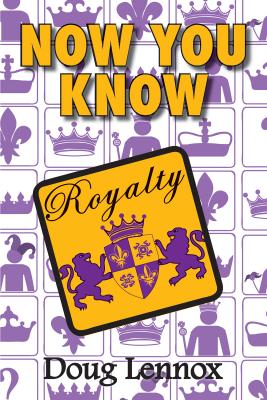Now You Know Royalty. Doug Lennox
Читать онлайн.| Название | Now You Know Royalty |
|---|---|
| Автор произведения | Doug Lennox |
| Жанр | Справочная литература: прочее |
| Серия | Now You Know |
| Издательство | Справочная литература: прочее |
| Год выпуска | 0 |
| isbn | 9781770706125 |
“The King never dies.” — Blackstone, book 1.17
“Is it not passing brave to be a king
And ride in triumph through Persepolis?” — Conquests of Tamburlaine , Marlowe, book 1
“Where the word of a king is, there is power.” — Ecclesiastes, 8.4, the Bible
“A substitute shines brightly as a king
Until a King be by.” — Merchant of Venice, act 5, scene 1, Shakespeare
“The King must not be under man but under God and under the law, because the law makes the King.” — Bracton
“Honour all men. Love the brotherhood. Fear God. Honour the King.” — Epistle of St. James, 1.17, the Bible
“The King is the centre of the majesty of the whole community.” — Blackstone
“I found that monarchy was the best government for the poor to live in, and commonwealths for the rich.” — The Vicar of Wakefield, Goldsmith
“Not all the water in the rough rude sea
Can wash the balm from an anointed king;
The breath of worldly men cannot depose
The deputy elected by the Lord.” — Richard II, act 3, scene 2, Shakespeare
“’Twixt kings and tyrants there’s this difference known; Kings seek their subjects’ good; tyrants their own.” — Kings and Tyrants, Herrick
“Ultimately, mercy is the surest sign by which the world may distinguish a true king.” — Corneille
“The Queen’s government must be carried on.” — Duke of Wellington
“What is a King — a man condemn’d to bear
The public burden of the nation’s care.” — Solomon, book 3, Prior
“Who made thee a prince and a judge over us?”
— Exodus, 2.14, the Bible
“Live pure, speak true, right wrong, follow the King —
Else, wherefore born?” — Gareth and Lynette, 1.117, Tennyson
“The mind is free, whate’er afflict the man,
A King's a King, do fortune what she can.” — The Barrons’ Wars, Michael Drayton
“There is only one species of interest felt for dethroned monarchs — how they bear their misfortunes.” — Charles Lever
“There’s such divinity doth hedge a King,
That treason can but peep to what it would.” — Hamlet, act 4, scene 5, Shakespeare
“I believe that constitutional monarchy is the best defence of democracy.” — Yehudi Menuhin
In the Confederation Debates it was resolved that the government of the new country would be carried on “by the Sovereign in person or by her representative duly authorized.”
What does the inscription on the Peace Tower in Ottawa mean?
The motto of the Royal Arms of Canada, A mari usque ad mare (“From sea to sea”) is taken from the 72nd Psalm — “And he [the King] shall have dominion from sea to sea and from the river unto the ends of the earth.” It is this psalm from which the name “Dominion of Canada” is also drawn. The beginning of the psalm is “Give the King thy judgments, O God, and thy righteousness unto the King’s son.” The cornerstone of the Peace Tower was laid in 1919 by Prince Edward, Prince of Wales, the son of King George V, and it is the first part of the 72nd Psalm that is carved on the Peace Tower.
Philosophers of Kingship
| Plato | “The Philosopher as King,” Books V to VII of The Republic (Athens, fourth century B.C.) |
| Aristotle | Politics (Greece, fourth century B.C.) |
| Henry de Bracton | Treatise on the Laws of England (England, before 1268) |
| St. Thomas Aquinas | On Kingship, To The King Of Cyprus (Italy, before 1274) |
| Niccolò Machiavelli | The Prince (Florence, 1514) |
| Claude de Seyssel | La Grant Monarchie de France (Turin, 1519) |
| Sir John Fortescue | In Praise of the Laws of England and Monarchia |
| John Aylmer | An Harborowe for Faithfull and Trewe Subjects |
| James I | Trew Law of Free Monarchies (Scotland, 1598) |
| Thomas Hobbes | Leviathan (England, 1651) |
| François de La Mothe-Fénelon | Les Aventures de Télémaque and Table de Chaulnes |
| Sir Robert Filmer | Patriarcha (England, 1680) |
| John Locke | Treatises of Government (England, 1690) |
| Henry St. John, Viscount Bolingbroke | The Idea of a Patriot King (Britain, 1738) |
| Charles de Secondat, Baron de Montesquieu | Spirit of the Laws (France, 1748) |
| Edmund Burke | Reflections on the French Revolution (Britain, 1790) |
| Louis, Viscount de Bonald | Theory of Political and Religious Power in Civil Society (France, 1796) |
| Joseph, Count de Miastre | Essay on the Generating Principle of Political Constitutions (Sardinia, 1810) |
| Walter Bagehot | The English Constitution (British Empire, 1867) |
| John Farthing | Freedom Wears a Crown (Canada, 1957) |
What is the difference between the terms imperial and royal ?
Though the word royal is often used to refer to all monarchs, it correctly only refers to a monarch of a kingdom and his or her family. Thus an empire has an imperial family (Japan), a kingdom (or dominion) has a royal family (United Kingdom, Canada), and a principality has a princely family (Monaco).
Quickies
